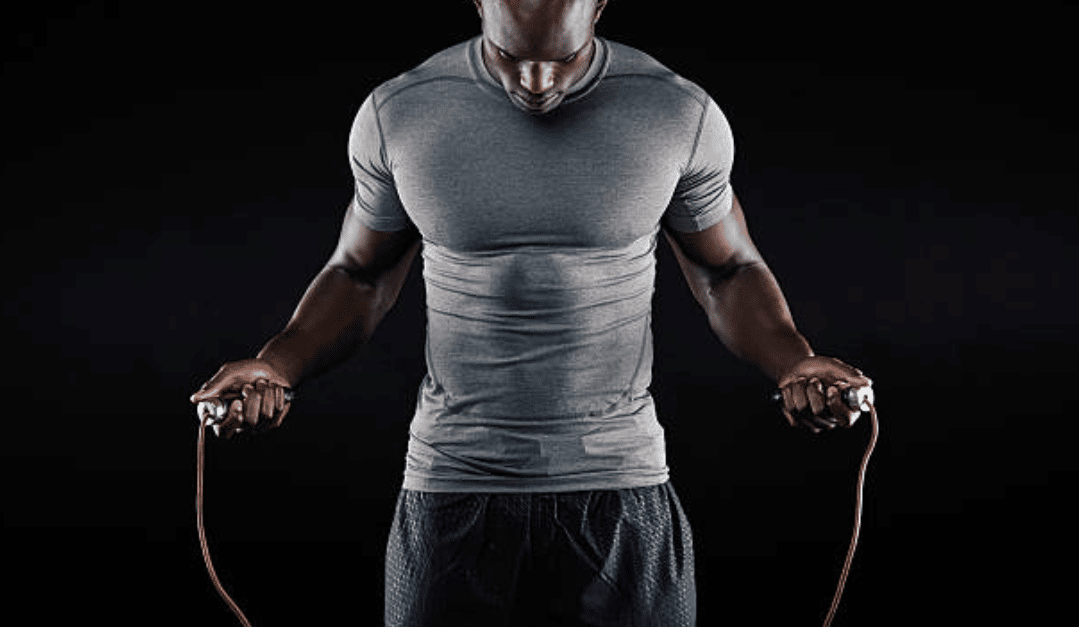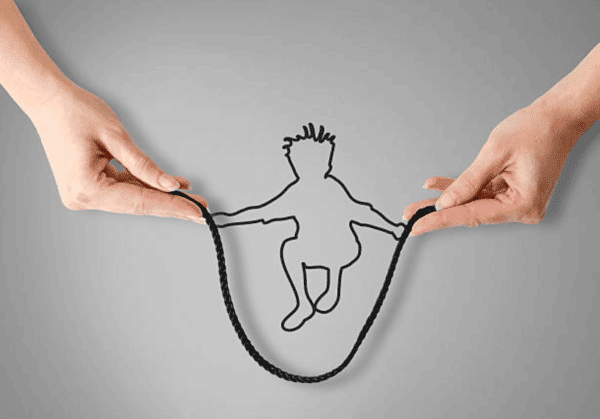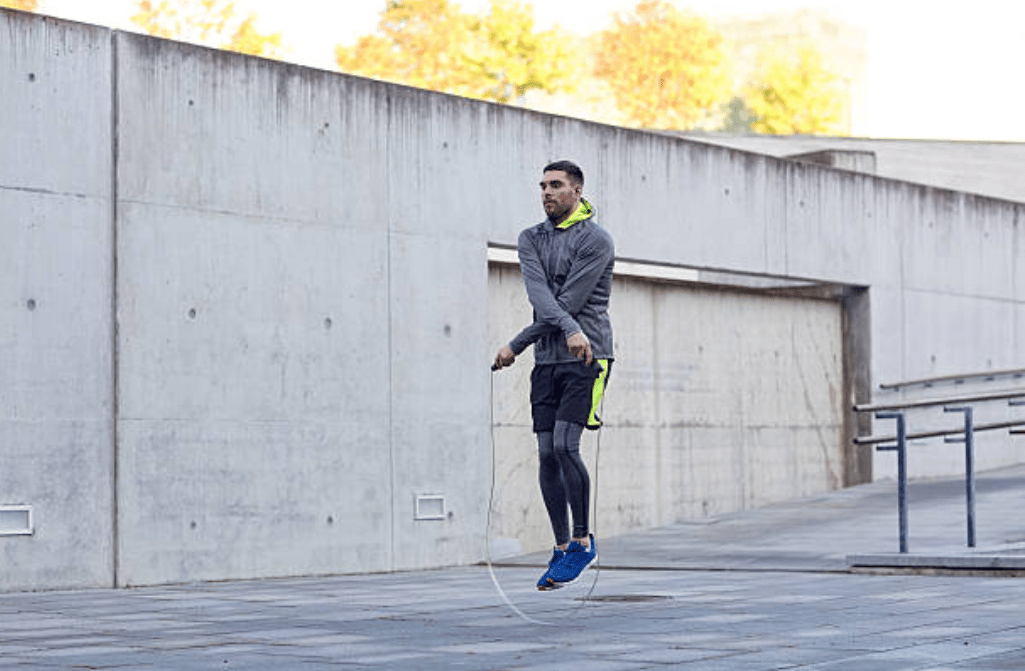Jumping rope is a complete cardio sport if you know what gestures, rhythms and frequency to adopt. In fact, it is an aerobic exercise that helps you lose weight and burn calories. This intense activity also helps to avoid blood circulation problems and helps to reduce cellulite. And for health, it helps control the cardiovascular system. In other words, it is good for the heart. It is done as well by men as by women.
Which muscles work with the jump rope?
The muscles that work with the skipping rope are all the muscles of the leg: glutes, thighs and calves as well as the abs.
Jumping rope for slimming
Did you know that the rate of calories burned during 15 minutes of jumping is equivalent to the same rate you lose when you run for 30 min? It's more intense than slow cardio exercises and therefore more effective. For this reason alone, you can see how beneficial this activity can be. All you need is the basics (which will be introduced to you later), proper clothing and water to keep you hydrated. Then, all you have to do is apply the tips, and of course, if you are diligent, you will start to lose the weight you want to get rid of.
Some instructions for practice
If you have any physical problems such as hip, knee, leg, etc., you should first seek the advice of your doctor before doing anything. The practice space should also be sufficient to prevent injury to others or yourself. The length of the rope must be well adjusted. To do this, place your foot in the middle of the rope and then raise your handles upwards along your body. The handles should be level with your shoulder.
As for the posture, you must remain straight. That is, your neck, head and spine must be in proper alignment. To gain abdominal muscle, you pull in your stomach and hold it there while you jump. And most importantly, you should always jump on the balls of your feet so that your knees don't bear your full weight.
A minimum warm-up is recommended if you want to avoid injuries and damage to your tendons and joints.
Concerning breathing, you inhale during the take-off phase, when the rope passes over your head. You then exhale during the jump. For best results, be sure to alternate different exercises.
The benefits of skipping rope
Besides the fact that skipping offers the same results as other exercises in less time, it offers many more benefits. It is a great way to prevent varicose veins and vein problems as mentioned above. In addition, when you practice skipping regularly, you also work on your cardiovascular endurance. And since it can become more intense when you master it, it gives you the opportunity to increase your stamina.
Depending on your base weight, for one hour of jumping rope you will burn an average of 500 calories. All you need is to have a good diet. For people who play other sports such as high jump, volleyball, basketball, or others, jumping rope is an important aid in improving vertical relaxation. This type of sport also contributes to your agility by strengthening your body's coordination, flexibility and balance. For those who practice weight training, skipping rope can replace the cardio at the end of the session.
Which jump rope program to adopt to lose calories
To get satisfactory results, it is necessary to diversify the exercises so that all the muscles work. Your level and the program you have to follow depend on your ability. But here are some variations that may be useful.
Feet together
This is the traditional form of jumping rope, the one that immediately comes to mind when we talk about it. It simply consists of repeating a jump with the feet together for each pass of the rope. This is the easiest exercise to do, but it is the one you should master first before doing the others.
Alternating feet
It simply consists of jumping one foot after the other. It may seem more difficult, but in reality, it is much less physical than the classic jump.
On one leg
Everything is already in the name. You throw one leg at a time. This form of skipping is an excellent workout for balance and ankle strengthening. You just have to make sure that both legs are doing the same amount of work in the same amount of time.
Knee lift
This involves doing a jump, either with your feet together and your knees up, or with your feet alternating and bringing one knee up with each jump. This is also a good cardio workout and makes you gain abdominal muscle.
Slalom or Twist
This exercise consists of doing jumps with the feet together, while alternating jumps to the left and right. It helps to strengthen the muscles of the inner thighs and the buttocks.
Heels to buttocks
You do jumps while you bring your heels up towards your buttocks. You can alternate your legs as well as join them on the same jump. This exercise allows you to tone your hamstrings.
Jumping Lunges
This exercise works the thighs and buttocks, but more intensely. It consists in carrying out jumps during which another foot is in front and one behind, the two in alternation.
Butterfly
You jump with the classic technique, but you just play with the movements of your arms. The idea is to cross and uncross the rope by passing your left hand to your right and vice versa.
Jumping Jack
It consists of alternating jumps with your legs apart and together. When the rope passes overhead, you will have your legs apart and you will have both feet together when it arrives under your feet. Jumping jack is a good way to strengthen muscle mass of the inner thighs and the lateral part of the buttocks.
Double jump
This means that for one jump, the rope passes under your feet twice. This one is too difficult or even impossible to achieve
Now that you have all the variants, you will have to test them to know which one you master or not
Jump Rope Program
Let's move on to the jump rope program:
You choose 3 exercises that seem easy for you from the list above and you can do as follows:
Day 1, 2 and 3: 1 minute of each exercise in sequence with a 1-minute rest every 3 exercises - to be done 4 times
D 4, 5 and 6 : 1 minute 30 of each exercise with a 1 minute rest every 3 exercises - to be done 4 times
Day 7, 8 and 9: 2 minutes of each in sequence with a 1-minute rest every 3 exercises - to be done 4 times
You can repeat the 9 days, reducing the resting time to 30 seconds when you master the exercises, then you can change the variations by choosing 3 other exercises that are more difficult to perform.
Need a coach to establish a personalized follow-up that corresponds to your objectives?
To conclude
Don't forget to hydrate between sets, it's very important
Note that jumping rope will burn calories, but if you are aiming for a of fat lossIt is advisable to review your diet and change it. Changing your eating habits is difficult for the first few weeks but will be beneficial in your weight loss in the long run. If on the other hand you are looking to build muscle, you can still do some cardio by jumping rope to improve your heart health and endurance. It should be taken into account that depending on your starting weight, the health of your knees, you will not be able to adopt this training style. If you are overweight for example, start with slow cardio and the same if your knees are weak.
Other articles to read :
Weight training or cardio: Which one to choose to lose fat?
Burpees, a very good bodybuilding exercise













3 Comments
Do you recommend doing this type of cardio only when you are lean or can you do jump rope when you are building muscle? I have heard that cardio is good for the heart even if you are building muscle. I would like to have your opinion since you write that it is good for building thighs. Thank you in advance for your time.
It is necessary to do cardio also in mass gain effectively for the heart but also to be able to be more enduring and to support large intense training sessions. Then it's all about nutrition.
oula
quite difficult when you are gaining weight at almost 87 kilos and doing jump rope but good article for beginners